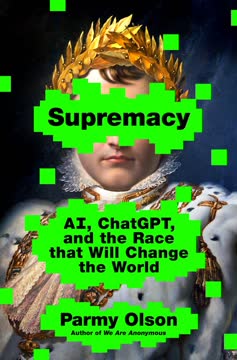Key Takeaways
1. Cooperation is the fundamental building block of all life.
Every living thing is composed of genes cooperating within genomes.
Life's layered structure. Cooperation isn't just about teamwork; it's woven into the very fabric of existence. From genes working together within a genome to cells collaborating to form multicellular organisms, life itself is a history of smaller units sacrificing individual autonomy to create larger, more complex entities. These "major evolutionary transitions" were pivotal moments, turning collections of parts into new kinds of "individuals."
From singletons to teams. The journey from free-living genetic material to complex organisms required units on lower levels to align their self-interest. Genes had to travel within cells, and cells within bodies. This imprisonment incentivized cooperation, as the success of the smaller units became tied to the success of the larger collective they inhabited.
Superorganisms exist. This principle extends beyond individual bodies. Highly social insect colonies, like those of ants and termites, function as "superorganisms." Workers specialize in tasks like foraging or defense, much like cells in a body, and their individual roles only make sense in the context of the colony's survival and reproduction.
2. Conflict is an inevitable companion to cooperation.
wherever cooperation exists, we know that there is the potential for conflict.
Inner battles. Even within seemingly unified entities like our bodies, conflict lurks. Genes and cells can act selfishly, trying to increase their own representation or gain resources at the expense of the collective. Examples include:
- Mitochondrial genes favoring female offspring (Mother's Curse).
- Meiotic drive genes cheating to appear in more sex cells.
- Cancer cells cooperating to proliferate, harming the host.
Suppressing renegades. For cooperation to prevail, these internal conflicts must be managed. Genes form a "parliament" to suppress selfish elements, and our bodies have evolved mechanisms to detect and eliminate potentially cancerous cells. However, these defenses are not foolproof, and selfish elements can still cause harm.
Cooperation's dark side. Cooperation at one level often creates competition at another. Cancer cells cooperate to the detriment of the body. Nepotism and corruption involve cooperation among a few, imposing costs on the wider society. This inherent tension means cooperation frequently has victims.
3. Family life, from parental care to cooperative breeding, is a costly evolutionary achievement.
parental care is a form of altruism and something that therefore warrants an evolutionary explanation.
Investing in offspring is not a given. While seemingly natural to humans, parental care is a costly investment that requires an evolutionary explanation. Many species lay eggs and leave, while others, like the black-lace spider, make the ultimate sacrifice by allowing offspring to consume them. Investing resources now means less for future reproduction or survival.
Who pays the cost? In most species where parental care occurs, females bear the brunt of the cost. This is partly due to biological differences (gestation, lactation) and lower parental certainty for males. However, males do invest when it benefits their genetic legacy, often as a byproduct of mate-guarding or when the sex ratio makes finding new partners difficult.
Cooperative breeding is rare but powerful. Some species, including humans, take family cooperation further, with older offspring helping parents raise younger siblings. This "cooperative breeding" is often found in harsh environments where teamwork is crucial. It allowed human mothers to reproduce more quickly than other apes, resolving the quality/quantity trade-off by raising high-quality offspring in relatively rapid succession.
4. Humans are unique cooperative breeders, raising children in extended social networks.
Humans are also part of this elite and rather diverse club, where mothers can expect to receive help from their older children in the business of rearing younger ones.
Beyond the nuclear family. Unlike other great apes where mothers raise offspring largely alone, humans evolved in societies where children were raised by multiple caregivers: fathers, older siblings, aunts, uncles, and grandparents. This extended family support is a defining feature of human sociality.
Adapting to harsh environments. Early humans faced unpredictable, resource-scarce environments. Cooperative breeding provided a crucial buffer against these challenges, allowing groups to share food, defend against predators, and teach complex foraging skills. This interdependence was essential for survival.
Challenging Western norms. The traditional Western ideal of the nuclear family, with mothers as primary caregivers, is an outlier in human history and cross-culturally. Research shows that children raised with multiple caregivers, including in formal childcare settings, develop just as well, if not better, than those raised solely by mothers, reflecting our evolutionary heritage as a profoundly social species.
5. Cooperation beyond family relies on reciprocity, interdependence, and shared interests.
sometimes help can be favoured by evolution because the helpful individuals themselves eventually derive a healthy return on their investments.
Beyond kin selection. While helping relatives is explained by inclusive fitness, cooperation with non-relatives requires different mechanisms. Reciprocity ("you scratch my back, I'll scratch yours") is one such mechanism, favored in repeated interactions where individuals can track past behavior and retaliate against cheats. Examples include:
- Vampire bats sharing blood meals.
- Pied flycatchers helping neighbors who previously helped them.
- Hamlet fish parcelling egg exchanges to ensure reciprocation.
Interdependence drives cooperation. Cooperation can also thrive when individuals have a shared stake in each other's welfare, even without direct reciprocation. If your survival depends on your partner's ability to perform a task (like bailing a sinking boat), it pays to invest in their well-being. This "interdependence" explains cooperation in contexts like:
- Maasai herders offering "no strings attached" help (osotua relationships).
- Group members benefiting from safety in numbers.
Relationships over ledgers. In close relationships like friendships, strict reciprocity can be detrimental. Not counting every favor signals interdependence and mutual investment, strengthening the bond. This suggests that human cooperation is not always a cold calculation of costs and benefits, but often driven by evolved psychological mechanisms that value relationships themselves.
6. Reputation and signaling are crucial for fostering trust with strangers.
Caring about what others think of us is a part of our psychology that has been honed by selection, but why?
The value of a good name. Reputation is information about past behavior that helps predict future trustworthiness. Humans are highly attuned to reputation, cooperating more when observed and managing their image. A good reputation is an investment that pays dividends, like higher prices on eBay or increased social standing.
Beyond human vanity. This concern for reputation isn't uniquely human. Cleaner fish, for example, provide better service to clients when being watched by potential future clients, demonstrating a rudimentary form of reputation management. However, humans use sophisticated cognitive abilities like perspective-taking to infer how actions affect others' perceptions, a skill lacking in cleaner fish and even other apes.
Costly signals build trust. Signals that are expensive or difficult to fake are more credible. A peacock's elaborate tail signals genetic quality. Human actions like hunting big game (despite low success rates) or donating to charity can function as costly signals of skill or generosity. These signals attract desirable partners (mates, allies) and build social capital, even if the immediate act is personally costly.
7. Humans possess a unique, sometimes irrational, drive for fairness and social comparison.
Rather than being rational maximisers, most of us are irretrievably hung up on social comparison and fairness.
Keeping up with the Joneses. Humans are uniquely preoccupied with comparing their outcomes to others, especially peers. This social comparison significantly impacts happiness and well-being. We are often willing to incur personal costs to prevent others from getting more than us, as demonstrated in the Ultimatum Game where unfair offers are rejected even if it means getting nothing.
Fairness emerges early. This aversion to inequity appears early in human development. Children, like adults, will sacrifice their own rewards to prevent a peer from receiving a disproportionately larger share. This suggests that a preference for fairness is deeply ingrained in the human psyche, not merely a learned behavior.
Apes don't compare. While some studies initially suggested other primates also show inequity aversion, later research indicates they are primarily reacting to their own expected reward, not comparing it to a partner's. Humans are unique among primates in our intense focus on relative outcomes and our willingness to enforce fairness, even at a personal cost.
8. Coalitions and collective action enabled humans to create egalitarian societies.
By joining forces, we managed to turn the tables, taking the power from the hands of the few and distributing it among the masses.
From despotism to equality. Unlike other great apes where social order is based on dominance hierarchies enforced by physical strength, early human societies were remarkably egalitarian. Reproductive success was shared more equally, and individuals who tried to dominate were often ridiculed, ostracized, or even killed.
Power in numbers. This shift was enabled by the human capacity for forming large "macrocoalitions." By uniting, subordinates could collectively resist the attempts of individuals to monopolize power or resources. This "reverse dominance hierarchy" was actively maintained through social pressure and sanctions against bullies.
The tug-of-war of power. Human social structure can be seen as a constant tension between the individual drive for dominance and the collective interest in equality. While the collective often prevailed in early societies, cultural inventions like democracy and separation of powers (as seen in pirate ships) are institutions that help maintain this balance, preventing the rise of unchecked tyranny.
9. Institutions like punishment are necessary to enforce cooperation but come with costs.
Adding a threat of punishment to a social dilemma fundamentally changes the incentives to cooperate and defect.
Beyond reciprocity. In large groups, simple reciprocity fails because punishing one cheat can inadvertently harm cooperators. Institutions, like the threat of punishment, change the rules of the game, making cooperation the more profitable strategy. Experiments show punishment significantly increases contributions to public goods.
The cost of enforcement. Punishment is a costly act for the punisher, making it a "second-order public good." Why pay to punish when others benefit from the enforced cooperation? Humans seem wired to enjoy punishing cheats, and punishers can gain reputational benefits, being seen as trustworthy and fair.
Punishment's double-edged sword. While the threat of punishment promotes cooperation, the execution can be destructive. "Eye for an eye" retaliation can escalate conflicts. Societies have evolved rules to limit punishment, but modern penal systems often prioritize retribution over reform, failing to repair social relationships or promote broader cooperation.
10. Our social nature makes us susceptible to paranoia and the power of shared beliefs.
paranoia might be a feature, rather than a bug, in our psychology.
The adaptive side of suspicion. In complex human societies where other people pose significant threats, a capacity for paranoia can be adaptive. It functions like a smoke alarm, alerting us to potential social dangers, even if it sometimes produces false alarms. This sensitivity is flexible, increasing with perceived social threat (e.g., low status, small social network, marginalization).
Beliefs as social tools. Many human beliefs, especially those not easily verifiable, function less like maps of reality and more like social tools. Shared beliefs, even irrational ones like conspiracy theories, can signal group membership and commitment, unlocking social benefits. This explains why we readily adopt beliefs held by our group and defend them, even against evidence.
The dark side of shared reality. While shared beliefs facilitate cooperation and coordination, they also make us vulnerable to misinformation and conflict. Our cognitive biases (confirmation bias, motivated reasoning) help us defend group-aligned beliefs, potentially hindering rational decision-making and sowing discord, especially in global challenges requiring unified action.
11. Large-scale cooperation faces the challenge of self-interest and global dilemmas.
Our failure to cooperate may spell disaster in the long term, but this timeline is far beyond the horizon that we typically consider.
The tragedy of the commons. Global problems like climate change, pollution, and resource depletion are massive social dilemmas. Individuals benefit from free-riding (e.g., flying, consuming), while the costs are diffuse and delayed. The short-term incentive for self-interest often outweighs the long-term need for collective action.
Instinct vs. necessity. Our social instinct evolved to favor cooperation with close kin and partners in repeated interactions. Tackling global issues requires cooperation with strangers on an unprecedented scale, often with delayed or uncertain benefits, which goes against our evolved psychology.
Crisis reveals limits and potential. Crises like the COVID-19 pandemic highlight our fundamental interdependence and can spark local cooperation (helping neighbors). However, they also reveal the limits of our moral regard, as individuals and nations prioritize immediate self-interest (stockpiling, vaccine nationalism). Yet, crises can also disrupt old habits and create opportunities for new, more cooperative approaches if we choose to seize them.
12. Cooperation is a competitive strategy, often creating victims.
Cooperation is, at heart, a means by which entities improve their own position in the world.
Cooperation as competition. What appears as cooperation from one perspective (e.g., Uber drivers coordinating surge pricing) is often a strategy to compete more effectively against others (passengers, other drivers). Cooperation is favored by evolution because it provides a better way for individuals or groups to succeed.
The cost to outsiders. This competitive nature means cooperation frequently has victims. Cancer cells cooperate to outcompete healthy cells. Corruption involves cooperation among a few, harming the wider public. Balancing the interests of those within our cooperative circle (family, friends, nation) against those outside is a fundamental moral and societal challenge.
Navigating competing loyalties. Our sense of morality is shaped by these competing demands. Is it right to prioritize family over a stranger, or national interest over global well-being? These dilemmas reflect the tension between different scales of cooperation. Understanding that cooperation is a tool for competition, not just altruism, is crucial for designing institutions that promote broader, more inclusive forms of cooperation necessary to address global challenges.
Last updated:
Review Summary
The Social Instinct receives largely positive reviews for its exploration of cooperation in evolution. Readers praise Raihani's clear writing, engaging examples, and synthesis of complex ideas. Many find the book informative and thought-provoking, particularly in its discussion of cooperation across species. Some reviewers note that parts of the book cover familiar ground for those well-versed in evolutionary biology. Overall, the book is commended for its accessible approach to understanding how cooperation shapes the world, from cellular to societal levels.
Similar Books









Download PDF
Download EPUB
.epub digital book format is ideal for reading ebooks on phones, tablets, and e-readers.




